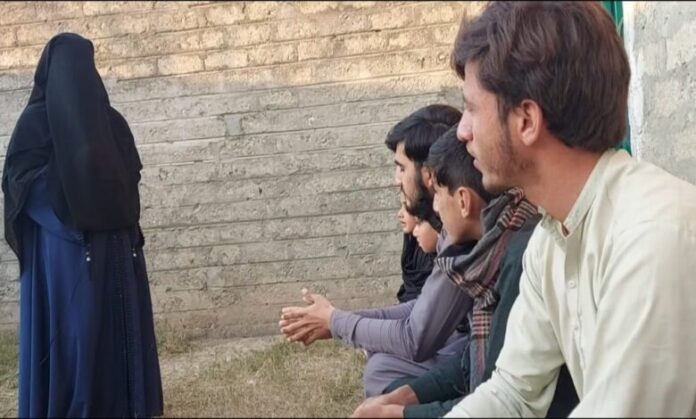
“I want to open the paths that are closed for women,” declared Saltanat Bibi from Tehsil Utman Khel in Bajaur. As the sole female candidate among the 126 contenders in the upcoming general elections on February 8, she is vying for a Provincial Assembly seat in constituency PK-21.
Bajaur’s population, as per the 2023 digital census, stands at 1,287,960 people. The Election Commission has outlined new constituencies, with one seat for the National Assembly and five for the Provincial Assembly up for grabs in the forthcoming elections.
Saltanat Bibi, a 26-year-old candidate for the Provincial Assembly, originally hails from Karachi, Sindh province. After completing the 8th standard, she relocated to Bajaur with her family and is currently a fifth-semester student pursuing a BS in Pakistan Studies.
Having spent most of her life in Karachi, Saltanat observed the stark contrast in facilities available to women and the challenges faced in Bajaur. Motivated to address these issues, she decided to enter the elections. Saltanat contends that women in Bajaur are given less priority, with many girls being deprived of education, and lacking access to employment, and basic health facilities.
Despite stringent customs, Saltanat emphasizes that her family’s unwavering support made her participation in the elections possible: “Understanding women’s issues requires a woman’s perspective. Despite comprising more than half of the population, women lack representation in legislative bodies, which is why they face significant challenges here.”
Also Read: The Balochistan Predicament: Unmasking Injustice Amidst Double Standards
In her election campaign, Saltanat Bibi expressed her commitment to reaching out to women door-to-door, encouraging their active involvement in the political and electoral processes. Her goal is to unlock closed avenues, fostering the development and prosperity of women. Saltanat Bibi emphasizes that safeguarding women’s rights and providing them with essential life facilities will be her top priority. She remains optimistic that both men and women in the constituency will extend their full support, ensuring her success.
The Election Commission reports a total of 126 candidates submitting nomination papers for Bajaur’s four provincial constituencies and one National Assembly seat. These include 19 for PK-19, 26 for PK-20, 26 for PK-21 (where Saltanat Bibi is running), and 35 for PK-22.
Sapna, a BS student from Tehsil Khar in Bajaur, views Saltanat Bibi’s decision as a new ray of hope for women. She believes it is not only a beneficial choice for Saltanat Bibi herself but also a source of encouragement for other women. Sapna expresses hope that more women will participate in upcoming elections, stating that women’s representation in both national and provincial assemblies is crucial to alleviating their problems—a representation currently lacking.
Highlighting the importance of women’s involvement in legislation and decision-making, Saltanat Bibi stressed that having women in these roles would make the process more effective, as women can better address and solve the issues faced by their fellow women.
Sapna noted that traditionally, women in Bajaur either abstain from voting or cast their votes according to the wishes of male family members. However, this time, Sapna encourages women not only to support Saltanat Bibi but also to persuade their male family members to vote for her.
As per the Election Commission data, Bajaur has a total of 664,711 registered voters, with 301,504 being female and 363,207 male. Political and social activist Wajid Ali commended Saltanat Bibi’s initiative, emphasizing the crucial role of women in society. He asserted that, just like women can be teachers or doctors, they can be politicians and should have an equal share in politics alongside men.
Wajid Ali expressed optimism that Saltanat Bibi’s decision would inspire other women to step forward, asserting their right to participate in politics. He emphasized the need for women in assemblies to discuss and address the problems unique to women, paralleling the importance of addressing men’s issues in society.
Ali asserts that where women actively participate in politics, their issues tend to be fewer. In Bajaur, the negligible involvement of women in the political and electoral processes contributes to the prevalence of their problems in the region.
It’s worth noting that the distinction of being the first woman from Bajaur to directly participate in elections goes to 50-year-old Badam Zari, who contested for the National Assembly seat in the 2013 elections. However, Saltanat Bibi holds the distinction of being the first woman from Bajaur to enter the electoral arena as a candidate for the provincial assembly.
When questioned about this, Maulana Rizwanullah stated that Islam does not prohibit women’s participation in elections, but this initiative is not traditionally well-regarded in tribal customs. He acknowledged that the positive change in people’s thinking is evident as women are now not only allowed to vote but are also participating in elections.
Maulana Rizwanullah emphasized the importance of recognizing the social status of women, asserting that only through this recognition can a prosperous and peaceful society be established, as men and women are the two fundamental units of every society.

